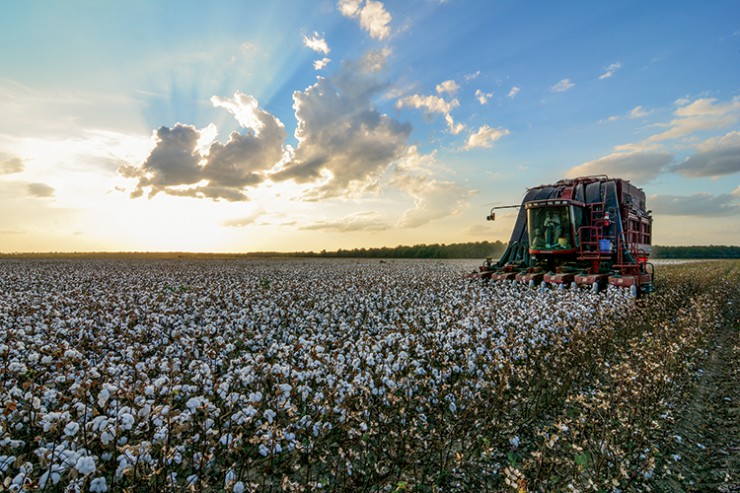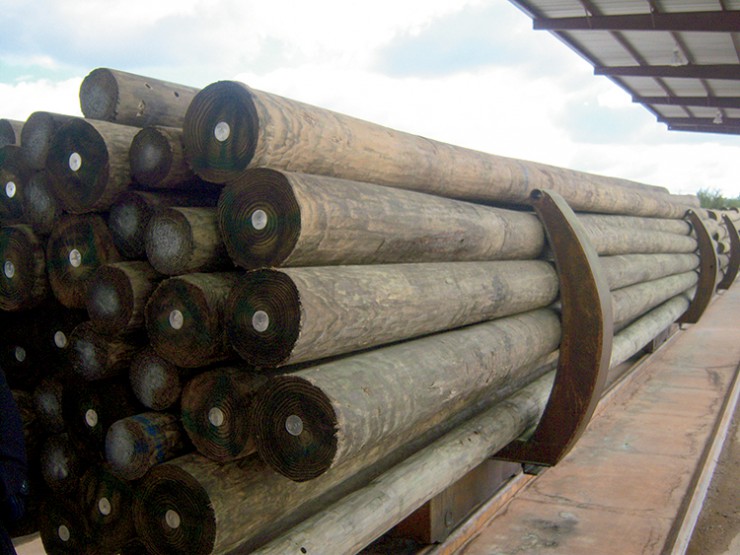Home > Mississippi > Mississippi Crops & Livestock > Mississippi Exports are Good to Go
Mississippi Exports are Good to Go
In partnership with: Mississippi Department of Agriculture and Commerce
 When it comes to leading agricultural commodities exported from Mississippi, it’s easy to see why cotton is at or near the top of the rankings each year. It’s an important product in the world’s expanding textile industries, and demand for the crop is growing in an increasing number of countries. The tremendous need for cotton certainly holds the attention of officials at Staple Cotton Cooperative Association, or Staplcotn, headquartered in Greenwood. Staplcotn was founded in 1921 and is the oldest and one of the largest cotton marketing cooperatives in the United States. “Cotton is of great importance in growing the world economy,” says David Camp, vice president of sales operations for Staplcotn. “More people in the world mean the need for more textile goods. Also, as the standards of living increase, particularly in emerging markets, the desire for better quality textile products also rises.”
When it comes to leading agricultural commodities exported from Mississippi, it’s easy to see why cotton is at or near the top of the rankings each year. It’s an important product in the world’s expanding textile industries, and demand for the crop is growing in an increasing number of countries. The tremendous need for cotton certainly holds the attention of officials at Staple Cotton Cooperative Association, or Staplcotn, headquartered in Greenwood. Staplcotn was founded in 1921 and is the oldest and one of the largest cotton marketing cooperatives in the United States. “Cotton is of great importance in growing the world economy,” says David Camp, vice president of sales operations for Staplcotn. “More people in the world mean the need for more textile goods. Also, as the standards of living increase, particularly in emerging markets, the desire for better quality textile products also rises.”  Growing by Leaps and Bounds Mississippi is a leading exporter of many agricultural products. According to the latest USDA figures from 2011, cotton led the state with $492.7 million in exports, followed by soybeans ($387.8 million), chicken meat ($385.7 million), rice ($143 million) and corn ($118.1 million). Total agriculture exports for 2011 were more than $2 billion. The numbers should continue to grow, says Barbara Travis of the Mississippi World Trade Center. “The world’s population is growing by leaps and bounds, which means there will be more food needs to be met and more markets for exports,” says Travis, executive director of the nonprofit that assists Mississippi businesses with all aspects of international trade
Growing by Leaps and Bounds Mississippi is a leading exporter of many agricultural products. According to the latest USDA figures from 2011, cotton led the state with $492.7 million in exports, followed by soybeans ($387.8 million), chicken meat ($385.7 million), rice ($143 million) and corn ($118.1 million). Total agriculture exports for 2011 were more than $2 billion. The numbers should continue to grow, says Barbara Travis of the Mississippi World Trade Center. “The world’s population is growing by leaps and bounds, which means there will be more food needs to be met and more markets for exports,” says Travis, executive director of the nonprofit that assists Mississippi businesses with all aspects of international trade  “Mississippi farmers are going to have all kinds of opportunities to meet that global demand. Worldwide need, demand and preference for U.S. products can translate into significantly increased sales for our agricultural industry.” The growing population will also increase the need for more animal protein throughout the world, and that means more demand for chicken meat. Mississippi’s export value for 2011 was second highest for chicken meat, second only to 2008 figures. “The export of chicken meat is very important,” says Lampkin Butts, chief operating officer for Sanderson Farms in Laurel, who served as chairman for the National Chicken Council. “It is more so now than ever before, not just to Sanderson but also the whole industry. About 15 percent of what Sanderson produces is exported, and the industry is exporting about 20 percent.” Most of what is exported is dark meat, as well as products such as chicken feet. “U.S. consumers prefer white meat,” Butts says, “so we’re left with an imbalance of dark meat. Being able to export it takes that protein out of the states and helps us get better pricing.
“Mississippi farmers are going to have all kinds of opportunities to meet that global demand. Worldwide need, demand and preference for U.S. products can translate into significantly increased sales for our agricultural industry.” The growing population will also increase the need for more animal protein throughout the world, and that means more demand for chicken meat. Mississippi’s export value for 2011 was second highest for chicken meat, second only to 2008 figures. “The export of chicken meat is very important,” says Lampkin Butts, chief operating officer for Sanderson Farms in Laurel, who served as chairman for the National Chicken Council. “It is more so now than ever before, not just to Sanderson but also the whole industry. About 15 percent of what Sanderson produces is exported, and the industry is exporting about 20 percent.” Most of what is exported is dark meat, as well as products such as chicken feet. “U.S. consumers prefer white meat,” Butts says, “so we’re left with an imbalance of dark meat. Being able to export it takes that protein out of the states and helps us get better pricing.  Flowers and Wood Products In addition to the major commodities, Mississippi also has an array of internationally marketed specialty products. A prime example is Van Zyverden, one of the largest wholesale distributors of flower bulbs in the country. Headquartered in Meridian with facilities in Holland and Washington, the company ships more than 350 million bulbs and plants annually in the United States and Canada. Another niche market for exports is wood products, and international sales are a promising market for Thomasson Company of Philadelphia. The wood products company which has exported utility poles, crossties and lumber, has seen a higher demand for products in the past four or five years. “We see a lot of opportunities in export for the products we sell. It’s a great way to diversify our business and grow our sales,” says Pat Thomasson, company owner.
Flowers and Wood Products In addition to the major commodities, Mississippi also has an array of internationally marketed specialty products. A prime example is Van Zyverden, one of the largest wholesale distributors of flower bulbs in the country. Headquartered in Meridian with facilities in Holland and Washington, the company ships more than 350 million bulbs and plants annually in the United States and Canada. Another niche market for exports is wood products, and international sales are a promising market for Thomasson Company of Philadelphia. The wood products company which has exported utility poles, crossties and lumber, has seen a higher demand for products in the past four or five years. “We see a lot of opportunities in export for the products we sell. It’s a great way to diversify our business and grow our sales,” says Pat Thomasson, company owner.



